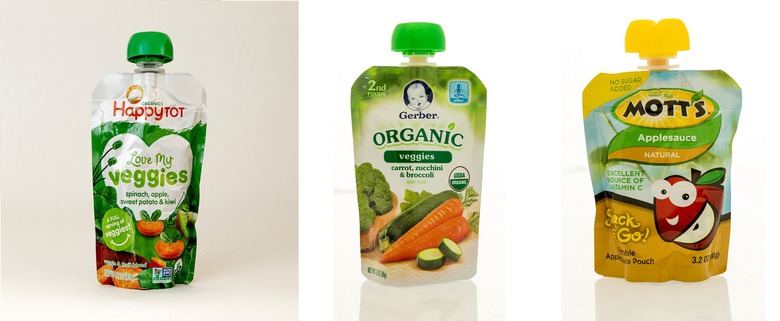Healthy Baby Food Is Hurting The Environment
You might have seen them at your local grocery store: Baby food is now being sold in tiny, single-serving pouches, rather than the recyclable glass jars typically used. The varieties sold in pouches are often touted as the healthier, cleaner option for parents and are applauded for the convenience of throwing a pouch or two into a bag without needing a spoon.
This new packaging isn't recyclable; the plastic trash buildup is being tossed in truckloads into landfills and oceans. In a world where experts estimate the oceans will contain more plastic than fish by 2050, this is a really big deal.
We all remember the Keurig cup disaster of 2015 — which, by the way is an ongoing problem. It seems consumers have bought into round two of the travesty, pouring over $45 million into the squeezable pouches in 2015 alone.
The pouches, often filled with puréed fruit, oatmeal, or another "clean eating" health food, are marketed towards health- and environmentally-conscious consumers, speaking to their quest for natural food and drink. But there's nothing less natural than poisoning the fish of the Atlantic, and nothing less conscious than contributing to worsening pollution.
The problem with the packaging is twofold. The pouches are not reusable, creating more plastic waste per serving than environmentally-friendly alternatives. Additionally, the pouches are impossible to salvage for recycling, since they're made of multiple layers that cannot be separated into recyclable components.
The glass jars of yore were much more Earth-friendly. Glass is, of course, recyclable, and despite the inconvenience of a shattered glass jar or the necessity of bringing a spoon to-go, it saved the Earth from a great deal of harm. Plus, it's not like glass or fish-killing plastic are the only two options. As Lindsay Gallimore, healthy blogger and environmental activist puts it, "Feeding your baby healthy purées could happen in so many other ways that don't require the little squishy packs."
So just how bad is the damage? Well, if the plastic is deposited into a landfill, it could take over 1,000 years to decompose — and in the interim it will leak all kinds of chemicals and pollutants into soil and water. If the plastic is deposited into an ocean, it puts wildlife and entire ecosystems in danger. According to the Center for Biological Diversity, fish in the North Pacific ingest 12,000 to 24,000 tons of plastic every year. These ingested plastics "can cause intestinal injury and death and transfer plastic up the food chain to bigger fish and marine mammals." Sea creatures are also at risk of physical harm from the plastics, whether by entanglement or choking.
It's time we stop buying so many products that kill our oceans and take to a few Earth-friendly activities instead.
